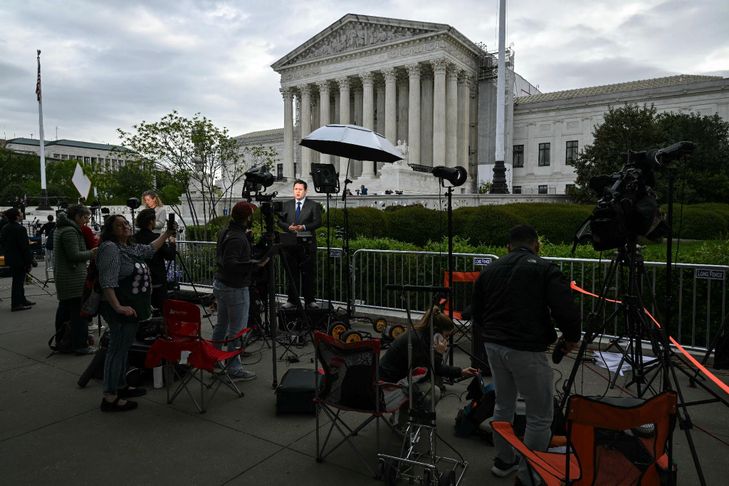The predominantly conservative US Supreme Court appeared Thursday resistant to arguments in favor of absolute criminal immunity invoked by Donald Trump as former president, but its decision could further delay his federal trial in Washington.
By deciding two months ago to take up this issue, the highest court in the United States has already postponed the federal trial of the former Republican president for attempting to illegally reverse the results of the election of 2020 won by Democrat Joe Biden.
If most of the nine judges were skeptical of the absolute immunity claimed by the Republican candidate in the November presidential election, several, particularly among conservatives, insisted on the long-term repercussions of their decision.
“We are writing a rule for posterity,” observed Neil Gorsuch, referring to the unprecedented nature of the question.
“This affair has enormous implications for the future of the presidency and the country,” added his colleague Brett Kavanaugh.
Donald Trump, who appeared at the same time in New York, where he has been on trial since April 15 for suspicious payments during the 2016 campaign, assured that criminal immunity was essential to the exercise of supreme power.
“Without immunity, you are not going to do anything, you become an honorary president”, for fear of being “indicted once you leave office”, he declared.
Army coup?
But the judges, notably the three progressives, fought head to head with Donald Trump’s lawyer, John Sauer.
“And if a president orders the army to organize a coup,” asked one of them, Elena Kagan, “is it an official act” covered by criminal immunity? ?
“It might well be,” the lawyer replied.

Members of the press in front of the Supreme Court of the United States, in Washington, April 25, 2024 / Mandel NGAN / AFP
Judge Ketanji Brown Jackson contrasted her fears of a risk of paralysis of the executive with that of a president freed from all criminal responsibility. In this scenario, she mentioned “a transformation of the Oval Office into the seat of criminal activity in this country”.
“His unprecedented thesis would exempt former presidents from criminal liability for corruption, treason, sedition, murder, and in this case, conspiracy to reverse the results of an election and remain in power,” listed the representative of the Ministry of Justice. Justice, Michael Dreeben.
Targeted by four separate criminal proceedings, Donald Trump is doing everything possible to go to trial as late as possible, at least after the presidential election.
The most politically fraught case, the federal case for the 2020 election, is on hold until the Supreme Court rules.
“Narrow window”
His trial in New York could therefore be the only one to reach an outcome before the vote.
Most legal experts predict Donald Trump will fail at the Supreme Court, as at first instance and then on appeal, but everything will depend on the speed of the Court’s decision and its formulation.
In particular, it could send the case back to a lower court to determine which acts could possibly escape prosecution, which would inevitably lead to further delays for this trial, initially scheduled for March.
“Even if the Court hands Trump a decisive and final defeat, I think the prosecution will have a lot of work to do to reach the trial before the election,” Steven Schwinn, professor of justice, told AFP before the hearing. constitutional law at the University of Illinois at Chicago (north).
“There remains a window but it is narrow and it is closing. The judges must act quickly, in which case there is a chance that the trial could begin in the fall, at the end of August or the beginning of September”, explained to AFP former federal prosecutor Randall Eliason, professor of criminal law at George Washington University.
“The Court must really take into account the fact that this is a unique case,” he believes. “We’ve never had a situation before where a defendant potentially has the ability to overturn his own indictment, if he wins the election. And then there will never be a trial,” he warns.
If he were elected again, Donald Trump could, once inaugurated in January 2025, order an end to federal proceedings against him.











